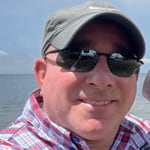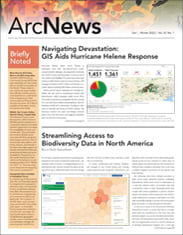Workforce retention is a hot topic. I encounter this concern often in conversation, and I find myself telling people that at Tallahassee-Leon County GIS in Florida, we don’t have a retention issue. In fact, most employees don’t leave until they retire! One person even came back after they retired and didn’t miss a beat.
Retention builds continuity and reduces the need to retrain. It also produces a flywheel effect, wherein employees’ capabilities build on one another, producing a highly productive and skilled team.

Tallahassee-Leon County GIS has a long history of providing mission-critical, professional GIS solutions and services across the enterprise. The program was created in 1990 through an interlocal agreement among the City of Tallahassee, Leon County Government, and the Leon County Property Appraiser’s office. The idea was to share an enterprise GIS platform that enables the creation and maintenance of data and apps for the many departments each entity serves.
I began my career in an entry-level GIS position and had six titles before reaching the role of coordinator of the interlocal program in 2013. After 31 years of service, I now find myself asking, What are we doing at the Tallahassee-Leon County GIS program that allows us to retain team members through the years?
I’m reminded of something that happened when I had been in the coordinator role for just three months. A team member approached me and said, “I want you to know, I really enjoy coming to work here. Thank you for what you are doing.” This has stuck with me.
Thinking about that interaction helps me step out of my role and look inward at my organization to discern what my team members want. It’s more than just money to pay the bills. They want the work they do to have value, and they want to know that they are valued. We all want what we do to make a difference. We want our work to be seen and utilized. And when we do a good job, we want to be told thanks or even garner broader recognition.
Managers need to be on the lookout for their employees’ milestones and accomplishments, and they need to say thank you. It is also important to make a work environment a fun and productive place. I like hosting breakfasts, usually when someone is celebrating a birthday or there has been a big team accomplishment. I love looking around the room and seeing the conversations and the comradery.
Managers should take interest in their team. If they want their staff to grow and learn, managers need to create those learning opportunities. There are many ways to do that.
Sending team members to conferences is a good start. Even if the whole GIS team can’t make it to the Esri User Conference in San Diego, California, for example, video recordings are made available online so anyone can watch. They cover hundreds of topics that can serve as research and development (R&D) and other learning opportunities. Managers should also try to establish or expand their budget for attending conferences—and encourage team members to present at them. It’s easier to get approval to travel if someone presents at a conference.
R&D is ingrained in my team. I ask staff members to take time during the week and research a GIS topic. This gives them a break from their everyday work to explore something new. It builds research skills, and people have fun with it. R&D has yielded savings as well at Tallahassee-Leon County GIS. Team members have learned skills that they then used to create products and services that the team previously paid for.
Another way to show team members how important they are is to make it standard for the organization to pay for professional memberships and certifications. This demonstrates that managers care about their team members and are willing to invest in them.
One big motivator for employees is knowing that they can achieve upward mobility in the organization they work for. At Tallahassee-Leon County GIS, we have worked hard with human resources and our chief information officer to formulate policies and documented growth paths that allow employees to achieve that mobility. We call this a progression plan, and it helps team members advance to the next level of their position without having to go through the budget process, which can take a long time. Progression plans offer employees long career paths that keep them dedicated—and this comes back to the organization in the form of long-term retention. At Tallahassee-Leon County GIS, there are six separate positions that employees can move to in the progression.
I hold the bar high for my team members, but I also ensure that I’ve provided them with the necessary tools to do the job. I make sure that they have high-end workstations, and I even let them choose their own mouse and keyboard. Little things like this go a long way.
I subscribe to leadership author John Maxwell’s notion that people can lead from wherever they are. To me, that means giving every team member the opportunity to do that—whether they’re leading a team, leading a workgroup, or supervising and assisting interns. In these scenarios, growth happens in all directions—for example, the intern gets hands-on learning, and the team member gets supervisory experience.
Creating an environment for retention is a multifaceted process. These are just some of the things we think about at Tallahassee-Leon County GIS. It takes time to develop a program that employees don’t want to leave. But at the heart of it is caring for your team.



